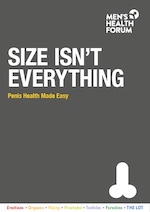Know Your Knob: all our penis health links
Klinefelter's Syndrome FAQs
What is Klinefelter's Syndrome (KS)?
In 1942 Dr Harry Klinefelter and his co-workers published a study about nine men who had enlarged breasts, sparse facial and body hair and small, firm, infertile testes. By the late 1950s other researchers discovered that men with Klinefelter's Syndrome had an extra sex chromosome giving 47XXY instead of the more usual 46XY.
How many men have KS?
Based on studies in the US in the 1970s it appears that KS is one of the more common genetic abnormalities affecting from 1 in 500 to 1 in 1000 live births.
How does it happen?
Women usually inherit two X chromosomes - one from each parent. Men inherit an X from their mothers and a Y from their fathers. However the cell division process that occurs in the cells destined to become eggs and sperm occasionally gives rise to an egg with two X's or a sperm with both an X and a Y.
This gives two chances to produce an XXY male. Either an XY sperm fertilises an X egg or a Y sperm fertilises an XX egg.
What are all these numbers?
They're the numbers of chromosomes. Human cells have 23 pairs of chromosomes, 46 in total. Men with KS have an extra X making 47. There are other less common variations; for example 48XXXY or 49XXXXY. There is also a mosaic type where some body cells are 46XY.
How does KS affect you?
Boys with or without KS tend to look very similar, but when puberty occurs the testes remain small and this persists into adult life. Infertility is usual and a lack of libido is likely. Some breast development is possible. A KS male may develop a pear-shaped body.
Men with KS tend to be tall but their limbs are disproportionately long compared with their bodies. Many also have big feet and obviously have problems getting clothing to fit.
Body hair may fail to appear and facial hair rarely attains the level that feelings of masculinity may desire.
Boys developing these characteristics are often teased at school and this may give rise to a boy 'turning off' and exhibiting behavioural problems.
Is there any treatment?
Many of these characteristics, but not the height or infertility, may be relieved by Testosterone Replacement Therapy given from puberty onwards. The level should be determined by the Endocrinologist.
Where insufficient testosterone is present, bone density may be reduced when the body fails to lay down sufficient calcium and this may give rise to bone disease such as osteoporosis. For this reason all KS males should request Bone-Density Scans at least every two years.
I think I may have KS. What should I do?
Go to your GP. He or she will probably refer you to an endocrinologist and/or arrange a chromosome test.
Where can I find out more?
- There is more medical information on Medline.
- Klinefelter's Syndrome Association UK
- Klinefelter Syndrome Awareness Day is held in March each year.
We don't currently post comments online but are always keen to hear your feedback.
Date published
02/04/14
Date of last review
02/04/14
Date of next review
02/04/17
References
|
The Men’s Health Forum need your support It’s tough for men to ask for help but if you don’t ask when you need it, things generally only get worse. So we’re asking. In the UK, one man in five dies before the age of 65. If we had health policies and services that better reflected the needs of the whole population, it might not be like that. But it is. Policies and services and indeed men have been like this for a long time and they don’t change overnight just because we want them to. It’s true that the UK’s men don’t have it bad compared to some other groups. We’re not asking you to ‘feel sorry’ for men or put them first. We’re talking here about something more complicated, something that falls outside the traditional charity fund-raising model of ‘doing something for those less fortunate than ourselves’. That model raises money but it seldom changes much. We’re talking about changing the way we look at the world. There is nothing inevitable about premature male death. Services accessible to all, a population better informed. These would benefit everyone - rich and poor, young and old, male and female - and that’s what we’re campaigning for. We’re not asking you to look at images of pity, we’re just asking you to look around at the society you live in, at the men you know and at the families with sons, fathers and grandads missing. Here’s our fund-raising page - please chip in if you can. |



